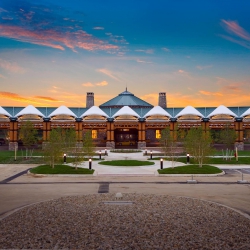The Pokagon Band of the Potawatomi Indians plan to open a casino in South Bend in the spring of 2018, while Indiana’s commercial casinos want tax breaks to offset the loss of revenues the competition represents.
The South Bend casino is the first Native American casino in the State of Indiana. Matt Bell of the Casino Association of Indiana says that the Pokagon Band’s new gaming venue is going to hurt revenues for the various commercial casinos in Indiana, especially in the north and northwestern portions of the state.
According to Bell, who serves as the CAI’s president, tribal casinos are not regulated the same way commercial casinos are regulated. Indiana’s gaming regulators will not be able to regulator the Pokagon Band’s casino operations they way they could a commercial casino, because the tribe’s casino is based on a reservation, which is considered sovereign territory.
When announcing the development, John C. Warren, Chairman of the Pokagon Band of Potawatomi Indians, said, “For the first time in 200 years, Indiana has Indian country in it again.”
Tribal Casinos’ Built-in Advantages
Under the 1988 Indian Gaming Act, US states cannot tax tribal casinos beyond the cost of oversight by state regulators. A minimal amount of regulation takes place, but only under the confines of a gaming compact the Pokagon Band will sign with the State of Indiana. States can raise the tax rate on tribal casinos, but only if concessions are negotiated between the tribe and the state. Those concessions tend to be monopolies over certain types of gaming, which themselves hurt the revenues of commercial casinos.
In short, tribal casino operators have a lot of advantages over commercial rivals. Because their tax rate is lower than commercial operators’ tax rate, Native American casinos can expand and renovate in grander fashion than their competitors. Over time, such an advantage means the tribal casinos are bigger and more opulent, and thus attract more customers. They can afford newer games, while offering bigger fees to musical acts and comedians.
Matt Bell Predicts Success for Pokagon Band
Matt Bell says the Pokagon Band of Potawatomi Indians have proven to be efficient administrators at their three casinos in Michigan, which all carry the Four Winds brand name. Given that fact, Bell expects the Four Winds South Bend Casino will be efficient and profitable, and thus a present a major challenge to Indiana’s already existing casinos.
Bell predicts that Indiana’s current land-based casinos are going to lose about one-third of their revenues, so Indiana’s treasury also will lose about one-third of its tax revenues from gambling. Some of those will be replaced by the South Bend Casino’s revenues, but obviously, the tax rate will be lower.
Indiana Casinos Want Lower Tax Rate
For those reasons, the Casino Association of Indiana is recommending that the Indiana state legislature lower the tax rates on Indiana’s commercial casinos. The CAI wants to keep the commercial casinos competitive with the Pokagon Band, which is portrayed as an act of fairness.
Commercial casinos received the right to relocate from riverbank casino locations to land-based complexes a couple of years, which helps. The casinos plan to lobby Indiana’s lawmakers to allow new types of games in the commercial casinos, as well as the right to open legal sportsbooks, if the US Supreme Court overturns the 25-year old PASPA federal sports betting ban.
South Bend Casino’s 1800 Slot Machines
For the time being, the South Bend casino will be more limited than its in-state rivals. Indiana Gaming Commission executive director Sara Tait says that Pokegon Band’s South Bend operation is going to contain slot machines only at first. 1800 slot machines will be found in the venue, along with 4 restaurants, 2 bars, and 1 coffee shop. Given the huge size of the facility — 175,000 square feet compared to perhaps 30,000 square feet in a riverboat casino — the Pokagon Band has the ability to expand operations quickly.
Tribal gaming operators in other US states have lobbied for state lawmakers to restrict sports betting for a number of years, to give them an advantage over their commercial rivals. For instance, the Michigan tribes are lobbying lawmakers in the state to ban Michigan’s commercial casinos from opening legal sportsbooks for 5 years, to give the tribes a chance to negotiate sports betting clauses in their gaming compact.
Pokagon Band Sportsbook?
Because of sovereignty issues, Native American tribes will not be able to open sportsbooks immediately upon the end of PASPA laws, even if a state passes sports betting legalization beforehand.
Negotiating gaming compacts can be long and contentious, so the Michigan tribes argue a 5-year ban on sports betting would give them a fair shot at competing. Commercial casinos like MGM Detroit and Greektown Casino are likely to argue that the tribes want to harm their business and gain an unnatural advantage, because the federal laws do not favor them.

